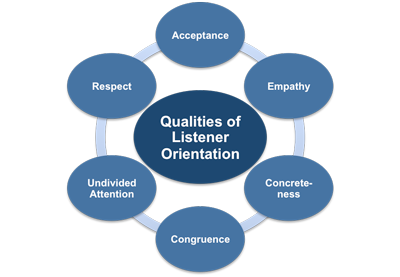

Sitting there silently nodding does not provide sure evidence that a person is listening, but asking a good question tells the speaker the listener has not only heard what was said, but that they comprehended it well enough to want additional information. These questions gently challenge old assumptions, but do so in a constructive way. To the contrary, people perceive the best listeners to be those who periodically ask questions that promote discovery and insight.

What you’re saying is…” However, recent research that we conducted suggests that these behaviors fall far short of describing good listening skills. In fact, much management advice on listening suggests doing these very things – encouraging listeners to remain quiet, nod and “mm-hmm” encouragingly, and then repeat back to the talker something like, “So, let me make sure I understand.

Being able to repeat what others have said, practically word-for-word.Letting others know you’re listening through facial expressions and verbal sounds (“Mmm-hmm”).In our experience, most people think good listening comes down to doing three things: People’s appraisal of their listening ability is much like their assessment of their driving skills, in that the great bulk of adults think they’re above average. We also invite you to check out our list of the 176+ best marketing tools to learn more about the platforms available for better social media management.Chances are you think you’re a good listener. If you're interested in tracking the impact of your marketing across 15 different online channels, let us know - the TrackMaven platform can help. It does not provide insight into the direct impact of your marketing programs. One important distinction: Social listening monitors individual conversations about a brand and industry. This feedback can be used to create more appealing offerings, both in the form of product and services as well as content and advertisements. Social listening allows marketing teams to prioritize and evaluate feedback from the public. Why is social listening important?Īs digital channels proliferate, there are myriad ways for consumers to share feedback and experiences - both directly and anonymously. It is also used to surface feedback that could help to differentiate their brand, product, or service. Marketing teams primarily use social listening for community management, such as identifying customer pain points and providing direct consumer response to questions, complaints, and comments. Social listening is the process of monitoring digital conversations to understand what customers are saying about a brand and industry online.


 0 kommentar(er)
0 kommentar(er)
